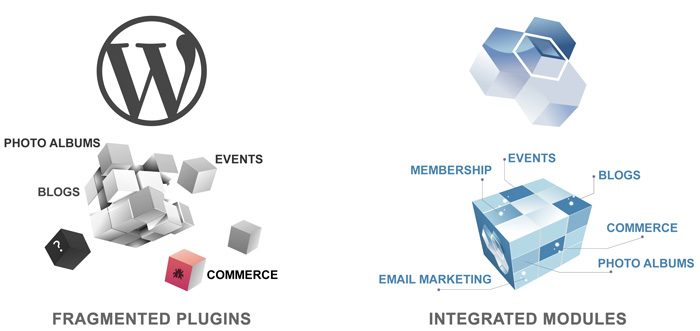Difference between Plug-ins and Modules

If you are new to Joomla, then you need to know the difference between modules and plug-ins. These may seem similar to the untrained eye, but they are as different as night and day. Let’s take a look at each in detail.
What are Modules?
Modules are basically flexible extensions in Joomla that are used to render pages. Also known as boxes, these are arranged around the components of each page such as the log-in module. Each one is assigned to a menu item so you can use them to hide a module according to the page you are currently on and some are assigned specific components. For instance a ‘latest news’ module will be linked to com_content and will also sport links to the latest content pieces. On the other hand, you do not have to link modules to components or anything for that matter. They can be used as static HTML or text.
Module positions serve as placeholders in a template which are used to pinpoint their location and which inform the application where it needs to assign outputs from modules that are based on a certain position. The designer of the template has absolute control over the positions and who can create variations between templates as well as their respective default positions that are assigned in the installation sample data via modules.
For instance, the Left module position can be set to be on that side of the template in order to display a navigation menu for a website. In other words, whenever a module is assigned a Left position, it will be exhibited wherever you position the Left module rather than on the left side of a page.
What are Plug-Ins?
These are the unsung heroes in Joomla because unlike modules and components, plug-ins are normally hidden in the background. These facilitate the functions of a website, for instance a plug-in for a search function enables it to work. As a module, this function requires the user to type in a search query, but it’s actually the plug-in that does all of the work. The module will still remain, but it cannot do anything until it has a plug-in that can enable it to function.
However, there are some plug-ins that can be seen in both the front and the back end such as a comments box. Even though it is a plug-in, it looks like a module and this includes the text editor that is used to edit articles.
So we have learned that modules are basically extra components that can be published on a web page depending on necessity and are typically used for navigation purposes. Plug-ins, on the other hand, are enablers that allow modules to work and are mostly present in the background.
There are of course, some exceptions and a thorough understanding of the CMS can clear them up. They might be obvious to those who are using Joomla or who are more familiar with its workings, but if you are a newbie, then the above-mentioned differences can help you navigate its features easily.